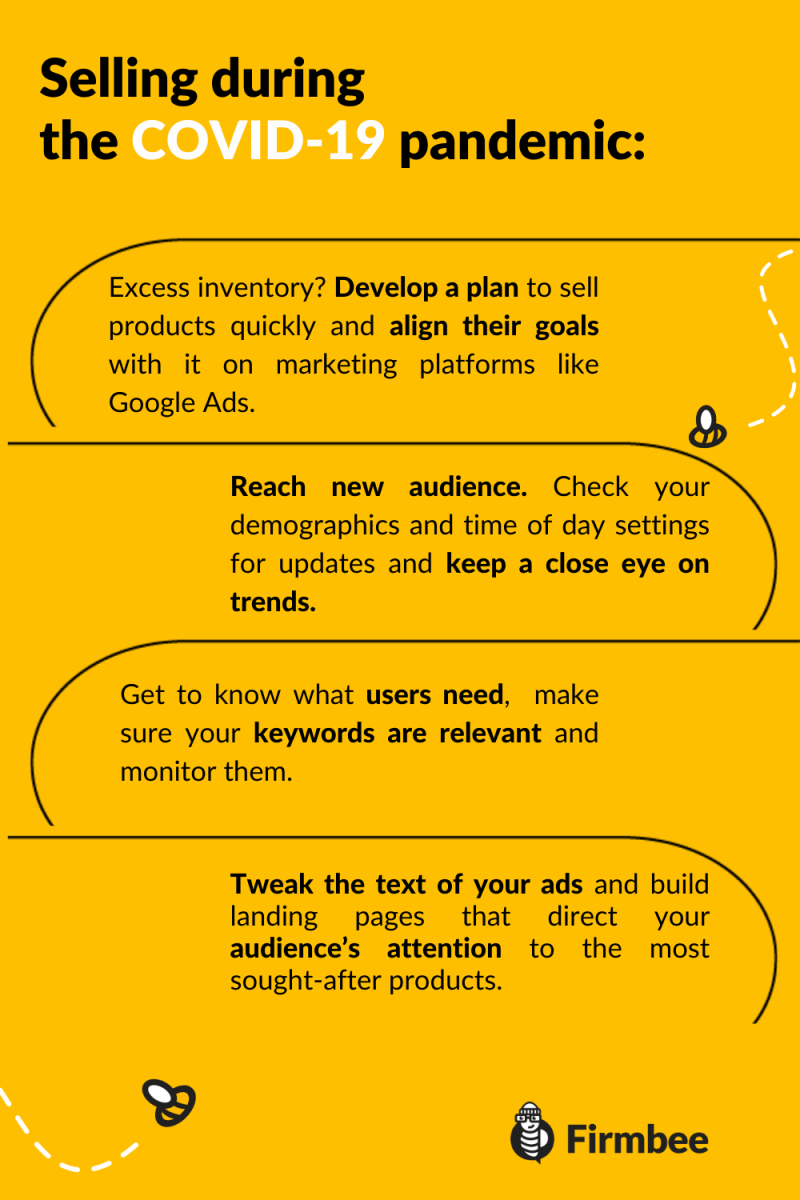Marketing strategy needs to be changes in times of pandemic. The #stayathome campaign, introduced to delay the scale of the spread of the COVID-19 virus, may have changed the shopping behavior of Internet users around the world. And while at first people reacted by stocking up on supplies and buying medical supplies and basic household items en masse, today they are simply cutting back on spending. How has the coronavirus outbreak affected sales in the e-commerce industry?
Selling during the COVID-19 pandemic – table of contents:
- Marketing strategy and sales in the face of crisis
- Accelerated sale of backlogged goods
- Reaching new audiences
- Keyword monitoring
- Updated advertising texts
Marketing strategy and sales amidst the ongoing crisis
In times of impending recession, with no clear recovery plans and uncertain bailouts, appetites for non-core items have clearly diminished. This in turn has already pushed many fashion and luxury brands to the brink of bankruptcy, and it doesn’t matter whether they sold online or offline.
Initially, loud theories that e-commerce in its entirety will come out of the crisis on its own can already be put between fairy tales. Although drugstores and grocery stores are clearly gaining ground, other segments are experiencing declines that even the worst-case scenarios would not have predicted. The more so, because segments such as fashion and e.g. consumer electronics have so far been the leaders in online trading. On the other hand, e-pharmacy and e-grocery, i.e. drugstore and “groceries” were not prepared for the current growth and are just getting used to it.
We can safely say that the crisis, apart from accelerating all market trends, will create new leaders in the long run. In the short and medium term, however, it is more than dangerous, and the smaller the entity and the less cash in its coffers, the worse it can get.
COVID-19 has forced many retailers to reformat their business, and those that have managed to retool fairly quickly to respond to new consumer demands (e.g. by starting to produce masks) are in a relatively good position.
However, it does not change the fact that there is no shortage of challenges. In the fashion industry there is already a problem with e.g. selling spring collections and earlier promotion of the summer catalog.

What can retailers do to survive the crisis?
Search Engine Land, suggests a few strategies that are worth looking into.
Accelerated sale of backlogged goods
Retailers with excess inventory should develop a plan to sell products quickly and align their goals with it on marketing platforms like Google Ads. Their campaigns should have a lower target ROAS to allow you to set higher rates and display ads to a larger audience. Lowering ROAS targets will provide the flexibility to test different strategies and determine which work best for different products. Also, decide how long you want to push sales of certain products so that if something doesn’t work, you can quickly cut back on spending and focus on products with more sales potential.
Reaching new audiences
The shopping behavior of home-confined users has changed a lot, so your Google Ads campaign targeting strategies should change too. Check your demographics and time of day settings for updates. Perhaps you haven’t paid attention to seniors before, who don’t usually shop online? See if they might now become your target audience. Your products didn’t sell during the day when people were in offices? Well, today they work mainly from their homes. Keep a close eye on trends by analyzing, for example, user behavior in Google Analytics. You’ll find most of the answers there.
Keyword monitoring
Tracking keyword performance across all your campaigns is more important today than ever. Nothing else will tell you what users need, and some industries have seen traffic from unusual phrases like “hand sanitizer” and “how to make yeast” increase noticeably. Make sure your keywords are relevant.
Updated advertising text
Also tweak the text of your ads and build landing pages that direct your audience’s attention to the most sought-after products. See, whether due to coronavirus, products that have received moderate interest so far are doing better. If so, perhaps they deserve a dedicated landing page?
To better understand e-customers behaviour, read our recent article where we we discuss this topic.
If you like our content, stay in touch by joining our Facebook community!
Author: Martin Sparks
E-commerce enthusiasts which constantly digs around the internet in order to make sure he hasn’t missed any important information on the topic of starting and scaling profitable online stores.


















